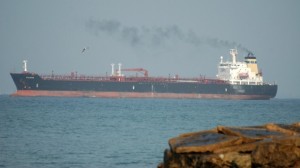 TOKYO, Oct 31 (Reuters) - Asia's top buyers of Iranian crude have reduced purchases by 11.5 percent so far this year, and shipments are set to fall further even after tentative signs of better relations between Tehran and Washington.
TOKYO, Oct 31 (Reuters) - Asia's top buyers of Iranian crude have reduced purchases by 11.5 percent so far this year, and shipments are set to fall further even after tentative signs of better relations between Tehran and Washington.Despite Iran's apparent willingness to compromise on its nuclear programme, the United States has not relaxed pressure on Iranian oil importers in Asia to keep cutting purchases.
Tough U.S. and the European Union sanctions have cut Iran's oil exports by over a million barrels per day and cost the country billions of dollars a month in lost revenue. The U.S. believes the impact on Iran's�economy�has forced Tehran to the negotiating table, and sources say the U.S. is unlikely to allow exports to rise before striking a deal on the nuclear programme.
Until then, Asian buyers need to show the United States evidence of continuous reductions in purchases from the OPEC member to qualify for a waiver from sanctions every six months.
"We will maintain our current stance until the United States takes actual action to ease sanctions," said a source at a north Asian buyer of Iranian crude. "There have been hopes that U.S. sanctions against Iranian oil import will be eased, but we can't change our trading policy only with hopes."
China, India and�South Korea�- three of Tehran's top four clients - have rebuffed Iranian offers for more oil, industry sources said. The United States is due to review their compliance with sanctions soon, and there is no need for them to boost Iranian purchases amid plentiful supply of alternatives.
"We haven't received any word from the United States about letting us increase Iran oil imports," said another Asian buyer.
"It seems that mood is getting better, but I think any increase (in the Iranian oil import) is likely to happen when the sanctions are lifted."
The four major Asian buyers between January and September imported 953,567 barrels per day (bpd) of Iranian crude, down 11.5 percent from the same nine months in 2012, according to government statistics and oil tanker arrival schedules.
Iran's oil sales are expected to fall sharply in October to their lowest in months at about 719,000 bpd, according to sources who track preliminary tanker loading plans.
That will come after a September rise in imports by the top four to 1.16 million bpd, a 30.2 percent jump from a year ago. This was in part due to an increase from India, where insurance issues had reduced imports to a trickle for months.
The European Union and the United States believe Iran is developing nuclear weapons, while Iran says its programme is for power generation.
TALKS
Nuclear experts from Iran and six big powers began talks on Wednesday, aiming to build on diplomatic momentum towards negotiating a peaceful solution to the dispute over Iran's nuclear ambitions.
Despite much friendlier contacts between the sides since Hassan Rouhani took office as Iranian president with a pledge to reduce tension with the West, major differences still need to be overcome before a breakthrough can be reached.
Top White House administration officials have been pushing U.S. lawmakers to hold off on new sanctions over Iran's nuclear programme, but some key lawmakers said on Wednesday now was not the time to ease up on pressure.
CUTTING IMPORTS
Of the top four buyers,�China, the biggest, would need to make huge cuts in its Iranian oil imports over the last quarter if it is to meet an unofficial target for 2013 and increase its chances for winning a waiver in December.
China's intake from Iran is running 1.4 percent higher than last year through the end of September, while officials have said refiners are likely to cut the imports 5-10 percent for the year.
India, Iran's No. 2 buyer is better off. Its crude imports from Iran fell 40 percent in the first nine months of this year.
South Korea's imports remain close to a commitment the country made to the U.S. to cut shipments for the June-November period by 15 percent.
Japan's crude imports from Iran in September rose 35 percent from a year earlier to 252,216 barrels per day, Ministry of�Economy, Trade and Industry data showed on Thursday. Imports for the first nine months of 2013 were up 2 percent on the year at 194,936 bpd, the data showed.
Japan, too, will have to cut sharply for the remainder of 2013 to reduce average daily imports below last year's level.
"I don't know how the things are going to be in reality," said a Japanese government official. "But theoretically speaking, the strict sanctions would likely mean demanding more cuts in Iranian oil imports from us buyers."
By Reuters
The Iran Project is not responsible for the content of quoted articles.










